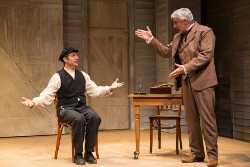|
"The Immigrant" settles in
George Street Playhouse
 |
| L-R: Ima (Gretchen Hall) and Leah (Lauriel
Friedman). Photo by T. Charles Erickson. |
Through
April 7
George Street Playhouse,103 College Farm Road, New Brunswick NJ.
Performances Wed. & Fri. at 8pm; Thurs. at 2; Sat. at 2 &8;
Sun. at 2pm & 7pm.
For tickets ($25-$78): 732-246-7717 or at www.georgestreetplayhouse.org
Reviewed
by Philip Dorian.
Ever wonder what happens to the inhabitants of Anatevka
after they are driven from their village at the end of "Fiddler
on the Roof?” We know that some of Tevye's family will be
staying with Uncle Abram in America (he doesn't know it yet), but
there must have been hundreds more than are represented in the "Fiddler"exit
tableau.
I might have encountered one of those refugees last week at George
Street Playhouse in New Brunswick, New Jersey, in the person of
Haskell Harelik, a twenty-something Russian Jew whose harrowing
journey from Anatevka (why not?) to the U.S. is enacted in the opening
minutes of "The Immigrant."Mark Harelik's 1985 play is
based on his actual grandfather's 1909 arrival and assimilation
into the U.S., but the characters and subject matter transcend the
specific. They are as relevant today as when the play is set.
Having arrived through the port of Galveston, Haskell (Benjamin
Pelteson), fatigued from wheeling his barrow of penny bananas, ends
up in the front yard of Milton and Ima Perry (R. Ward Duffy and
Gretchen Hall) in the rural community of Hamilton, Texas. (Between
1906 and '14, U.S. Immigration diverted some 10,000 Jewish immigrants
westward to avoid their concentration in New York City. How did
that work out?) After some language-barrier confusion, which Ima
tries to overcome BY TALKING LOUD AND SLOW, the devout Christian
woman convinces her banker husband to give Haskell a room for the
night, which, after some awkwardness over his being Jewish, turns
into six weeks.
That ethnic awkwardness, even among the townsfolk, is minimized
in favor of exploring the relationships and the Harelik family lineage.
Specific as that seems, it represents the experience of countless
numbers of escapees, particularly Jews, from the pogroms of Eastern
Europe in the early 20th Century and from Western European oppression
a generation later.
The first act is a seamless progression of Haskell's assimilation
and the growing bond of friendship between the unlikely couples
after Haskell's young wife Leah (Lauriel Friedman) finally joins
him. The process is not without some stumbling blocks, but the overall
tone is welcoming. With Milton's financial backing, including to
purchase a horse (Tevye would be pleased), Haskell's wheelbarrow
morphs into a fruit stand and eventually a grocery store.
The second act is crowded with Harelik-family details and some disconcerting
melodrama. When Leah becomes pregnant, she turns to Ima for comfort
and the two establish a warm mother-daughter relationship, which
Hall and Friedman portray as if it were true. (Their naturalistic
kitchen scene is a gem.) The young couple has two more sons (or
three – I lost count) in rapid succession, the youngest of
whom was the playwright's father. We zoom through their growing
up, including one World War II enlistee.
 |
| L-R: Haskell (Benjamin Pelteson) and Milton
(R. Ward Duffy). Photo by T. Charles Erickson. |
There's some business about Milton not having been
baptized, which of course presages his demise, and an allusion or
two to Milton and Ima's son, who left home years before. In a climactic
scene Milton and Ima are guests at Shabbat dinner for the first
time (after 30 years of close friendship? Really?) At any rate,
the dinner-rituals are explained to the guests – and through
them to the audience. At that dinner, the two men argue over America's
role in the coming war and its impact in Europe, with Haskell urging
intervention in opposition to Milton's isolationism. After a personal
insult (about the missing son), Milton storms out, effectively ending
their friendship.
Pelteson is excellent throughout. As Haskell initially grapples
with the language, the actor mines the humor without poking fun
at the character. Milton progresses from mere tolerance (of Haskell)
to gruff affection, and finally to hostility. Duffy meets the challenge
effectively, as does Ms. Friedman as Leah, at first shy and fearful
and later secure as wife and mother (and the playwright's grandmother).
Ima is the only role with substantial two-scenes with each of the
others, and Ms. Hall is wonderful. Ima interacts differently with
each character, but it all emanates from the one multi-faceted woman.
Hall's Ima is a pre-modern feminist – if only the designation
existed at that time in Hamilton, Texas.
Under Jim Jack's smooth direction, the relationships grow and deepen
over the years, with the cast aging believably, not overdone. Jason
Simms' scenic design allows for multiple locations without clutter,
and Asta Bennie Hostetter's costumes are ethnic- and period-authentic,
the latter modeled to perfection by Ms. Hall.
According to the playwright's bio, "The Immigrant"was
the most widely produced play in the country in 1991. I saw it for
the first time this month, and am glad that I did. You would be
too.
|



